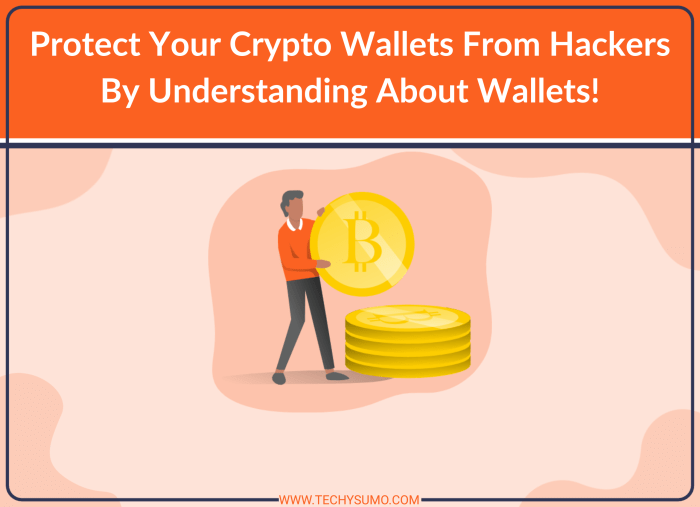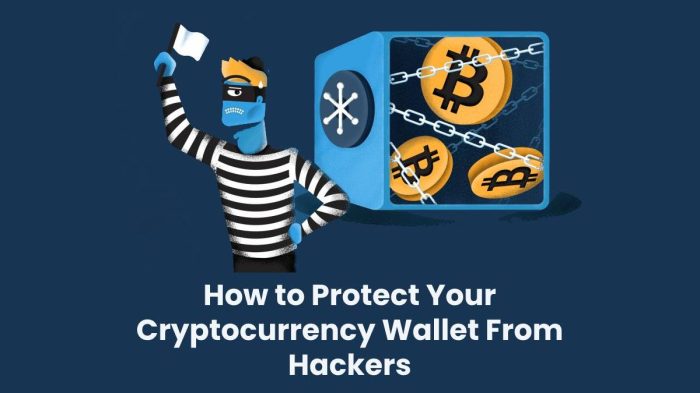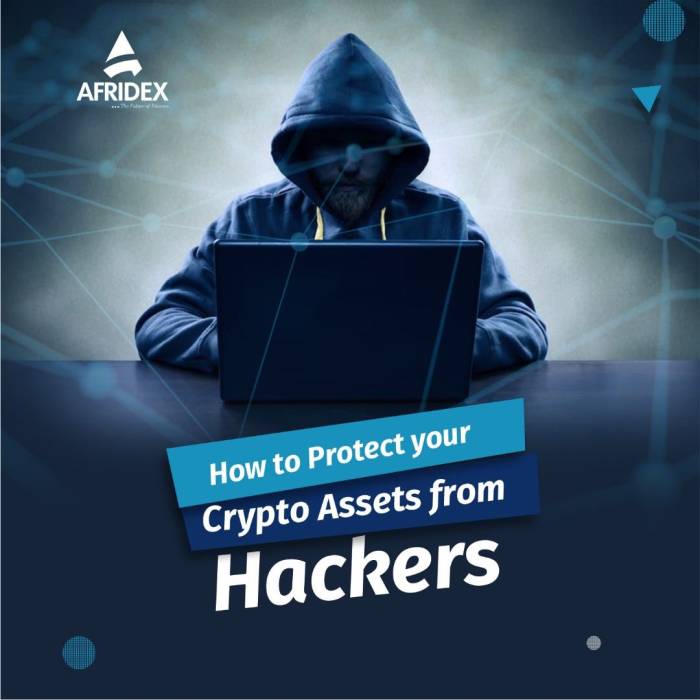How to Safeguard Your Crypto from Hackers dives into the world of crypto security with a mix of street smarts and tech know-how. Get ready to level up your game and protect your digital assets like a pro.
In this guide, we’ll break down the essentials of securing your crypto investments from cyber threats, giving you the upper hand in the fast-paced world of cryptocurrencies.
Understanding Crypto Wallets: How To Safeguard Your Crypto From Hackers

Cryptocurrency wallets are essential tools for storing, sending, and receiving digital assets securely. There are different types of crypto wallets available, each with its own unique features and benefits.
Types of Crypto Wallets
- Hot Wallets: Hot wallets are connected to the internet and are convenient for frequent trading. However, they are more susceptible to hacking attacks.
- Cold Wallets: Cold wallets, on the other hand, are offline devices used to store crypto assets securely. They are less vulnerable to cyber threats but may not be as convenient for active trading.
Popular Crypto Wallet Providers
- MetaMask: A popular hot wallet that is compatible with various decentralized applications (DApps) on the Ethereum blockchain.
- Trezor: A leading cold wallet provider known for its robust security features and user-friendly interface.
- Ledger Nano S: Another reputable cold wallet option that supports a wide range of cryptocurrencies and offers top-notch security measures.
Importance of Choosing a Reputable Wallet
When it comes to safeguarding your crypto assets, choosing a reputable wallet provider is crucial. Opting for a well-established and trusted wallet can help minimize the risk of hacks and ensure the security of your digital funds.
Implementing Two-Factor Authentication

When it comes to safeguarding your crypto accounts, two-factor authentication (2FA) plays a crucial role in adding an extra layer of security to prevent unauthorized access.
Setting Up 2FA on Crypto Exchanges or Wallets
- Log in to your crypto exchange or wallet account.
- Go to the security settings or account settings section.
- Look for the option to enable two-factor authentication.
- Choose your preferred method of 2FA: SMS codes, authenticator apps like Google Authenticator, or hardware keys like YubiKey.
- Follow the on-screen instructions to complete the setup process.
Benefits of Using 2FA for Security
- Provides an additional layer of protection beyond just a password.
- Reduces the risk of unauthorized access even if your password is compromised.
- Enhances the overall security of your crypto holdings and sensitive information.
Common Methods for 2FA
- SMS Codes: A one-time code sent to your phone via text message for verification.
- Authenticator Apps: Apps like Google Authenticator generate a code that refreshes every few seconds for login verification.
- Hardware Keys: Physical devices like YubiKey that you insert into your computer for authentication.
Keeping Software Up to Date
Regularly updating crypto wallets and software is crucial in the world of cryptocurrencies to ensure the security of your digital assets. By keeping your software up to date, you are protecting yourself from potential vulnerabilities and exploits that hackers may use to gain unauthorized access to your funds.
Importance of Software Updates
- Software updates often contain security patches that fix known vulnerabilities.
- Updates may introduce new features to enhance the user experience and security measures.
- Using outdated software exposes you to risks of hacking and theft of your crypto assets.
How to Check for Updates and Safely Upgrade
Always download updates from official sources to avoid malware or phishing attacks.
- Regularly visit the official website or repository of your crypto wallet to check for updates.
- Enable automatic updates if available to ensure you are always running the latest version.
- Before upgrading, make sure to back up your wallet and private keys in a secure location.
- Follow the instructions provided by the wallet developer for a smooth upgrade process.
Best Practices for Maintaining Security
- Use strong, unique passwords for your wallet and enable two-factor authentication for an added layer of security.
- Avoid downloading software or updates from untrusted sources to prevent malware infections.
- Regularly monitor your accounts for any suspicious activity that may indicate a security breach.
- Consider using hardware wallets for an extra level of protection against cyber threats.
Avoiding Phishing Scams

Phishing scams are a common tactic used by hackers to trick individuals into revealing sensitive information. It’s crucial to be aware of these schemes to protect your crypto assets.
Identify Common Phishing Tactics
- Impersonating legitimate crypto exchanges or wallets through fake websites or emails.
- Sending messages claiming urgent action is required to access your account or funds.
- Using scare tactics like threats of suspension or penalties to prompt immediate response.
Recognize Phishing Attempts, How to Safeguard Your Crypto from Hackers
- Check the sender’s email address or domain for any inconsistencies or misspellings.
- Avoid clicking on suspicious links or downloading attachments from unknown sources.
- Look for grammatical errors or unusual language in the communication.
Verify Communication Authenticity
- Double-check the website URL to ensure it matches the official crypto platform.
- Reach out to the company directly through their official channels to confirm any requests for information or action.
- Use two-factor authentication for all transactions to add an extra layer of security.
Importance of Not Sharing Sensitive Information
- Never provide your private keys, passwords, or seed phrases to anyone, especially online or through unsolicited messages.
- Keep your personal information confidential and avoid sharing it on social media or public platforms.
- Stay vigilant and trust your instincts if something feels off or suspicious.